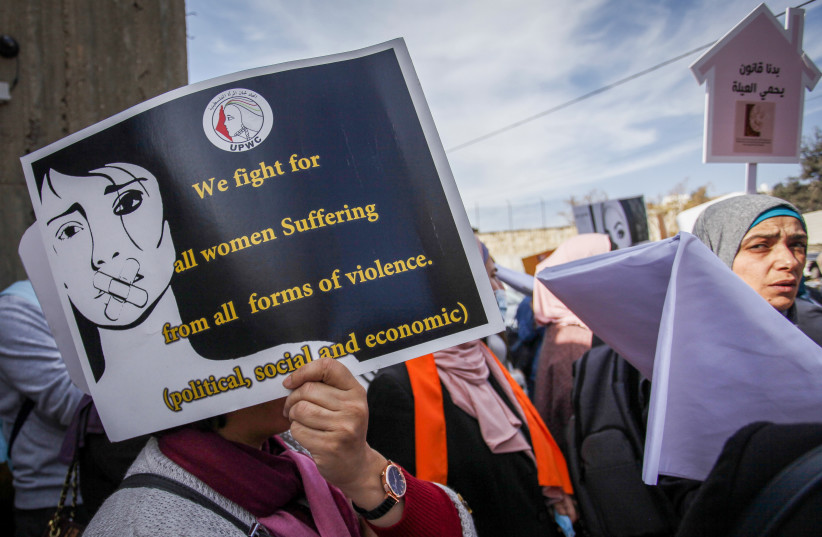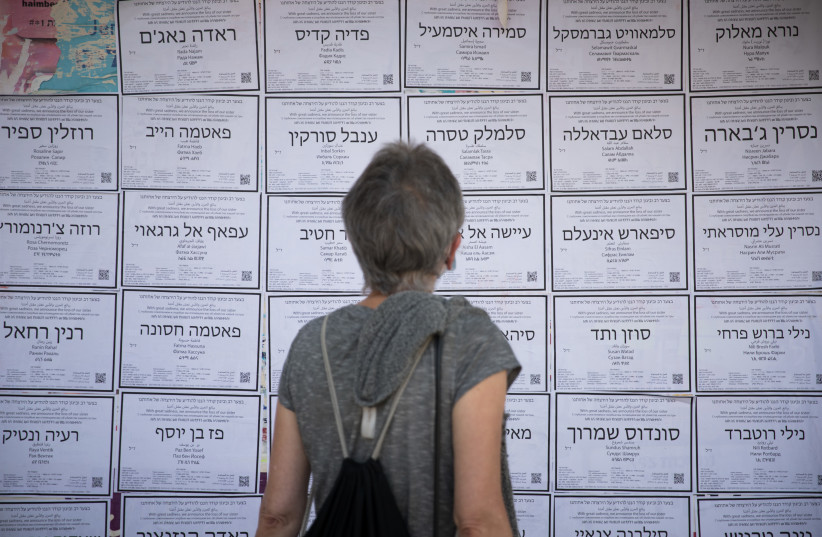A total of 24 women were murdered in femicide cases in Israel throughout 2022, averaging two femicide murders every month, the annual report from the Israel Observatory on Femicide (IOF) has found.
The 2022 report marks a concerning increase in femicide cases, which are up by 50% from 2021, during which 16 women were murdered in femicide cases. Furthermore, despite the Arab sector only making up 21% of Israel's total population, 50% of women murdered in 2022 were Israeli-Arabs, the study found, indicating a disproportionate wave of gender violence within Arab society.
According to the Abraham Initiatives, 120 people in the Arab sector were murdered in 2022, 14 of them women. Of this number, 12 were killed in femicide cases and the remaining two died as the result of a stray bullet. The overal number of murders in the Arab Israeli sector in 2021 amounted to 125, with femicide cases accounting for eight of those deaths.
This then indicates a 50% rise in femicide cases in the Arab sector over the last year, despite the overall number of Arab-sector murders being slightly lower.
In two cases, the perpetrator of the crime was Arab-Israeli and the victim was Jewish-Israeli. However, the IOF stresses, the murders were not nationalistic in nature and were instead purely motivated by gender-based violence.

Despite the disproportionate number of femicide deaths in the Arab sector, the IOF found that femicide cases involving an Arab-Israeli are far less likely to be solved than cases involving a Jewish Israeli.
Femicide is defined as "the intentional killing of women because they are female," and so, in accordance with this, the report does not cover instances in which women were killed due to involvement in crime or other such murders.
"Nobody is writing about matricide, nobody seems to be concerned. We're seeing the same number again this year as last year."
Prof. Shalva Weil
As is commonly observed in gender-based violence, 79% of murderers or suspected murderers had some sort of prior connection to their victim. 58% of femicide victims in 2022 were murdered either by their spouse or partner in jealousy-related incidents or "honor killings."
In 36% of instances, at least one child was present and witnessed the murder of their mother and in contrast, in four cases, the murderer was identified to be the victim's son.
Matricide in Israel is infrequent but concerning
In the 2021 report on femicide in Israel, the IOF noted a disturbing rise of matricide cases, with four having been committed that year. In 2022, the number of matricide cases is the same, but the overall number of femicides is higher, thus matricides make up a smaller percentage of the overall number. Nevertheless, the increase in matricide deaths continues to be of concern.
"Nobody is writing about matricide, nobody seems to be concerned," IOF Chair Prof. Shalva Weil tells the Jerusalem Post. "We're seeing the same number again this year as last year. And four cases is a lot in such a small country. Why are sons murdering their mothers? It's horrific."
She adds that while the numbers remain low in comparison to other countries, and it is not a widespread phenomenon, it is still a very concerning one.
Femicide in numbers
The youngest femicide victim of 2022 was just 14 years old, and the oldest was 68, the IOF found. Of those charged with, or suspected of, femicide, the youngest was 19 and the oldest 65.
According to the IOF report, 12 out of the 24 murderers have either confessed to their crimes or were found guilty, while in other cases, the murderer has yet to be identified by the police or charged with a crime. Two of the murderers committed suicide following the conviction, and in another five cases, the murderer or suspected murderer has attempted to commit suicide as well.

In one-third of all cases in 2022, the suspect was known to the police or to welfare authorities prior to the murder, either due to previous violent altercations or for financial reasons. In other cases, the murderer was known to have a psychiatric or criminal record.
During June 2022, four separate femicides were carried out over the span of just ten days, accounting for close to 17% of all femicides that year and making it the most deadly month for women in 2022.
The correlation between politics and gender violence
Weil explained that, while it is too early to tell whether or not the new Israeli government, and the political atmosphere in general, will influence an upward trend in domestic violence and its extreme form of femicide, generally the rate of femicide, politics and gender equality go hand in hand.
"There's not very much gender equality in the Israeli parliament these days," she says, referencing the new government, of which women occupy just nine out of 64 slots.
"Look at one of the few women in the government, Tali Gottlieb, who entered in the slot reserved for new women," she says. "Gottlieb is a lawyer who defended rapists, so it doesn't make sense...what kind of gender equality do we have there?"
Countries that have much higher rates of gender equality also have lower rates of femicide, Weil explains, citing Sweden as an example of such a phenomenon.
So while it is too soon to tell just what sort of impact the new government will have on violence against women in Israel, the outlook doesn't look too promising.
One such indication that the government won't be putting femicide at the top of its list of priorities in an agreement signed by Likud and the Religious Zionist Party back in December, in which they agreed that the government will not approve Israel's accession to the Istanbul Convention.
The Istanbul Convention is the first international convention in which the prevention of violence against women is regulated and which recognizes the phenomenon of violence against women, in both the private and public spheres, as a global phenomenon.
While it is true that the rate of femicide in Israel is lower than it is in other countries, such as Canada or the UK, Weil says there is no clear explanation as to why this is the case, and that the low numbers don't make each individual case any less alarming or tragic.
"Just one case is enough to devastate dozens of people and families," she says "in Israel, everyone knows everyone."
